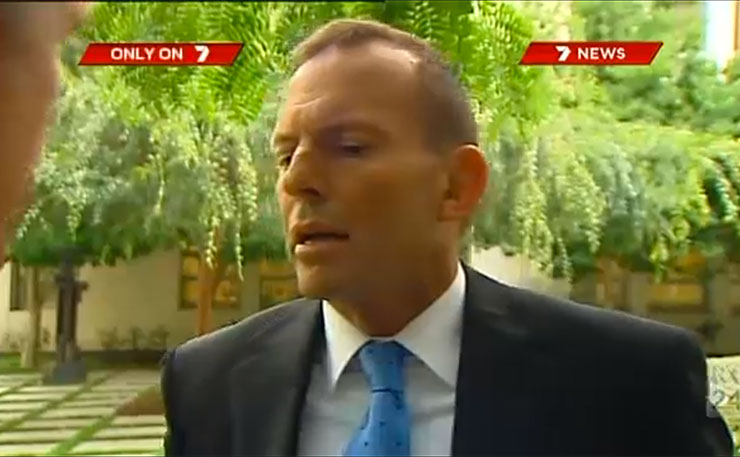Last night, the Liberals laid to rest our Prime Minister for Indigenous Affairs.
Anthony John Abbott – aka Tony Abbott – was said to be a man passionate about the nation’s First Peoples, a politician who was more than happy to give up the cold but cosy comfort of Canberra to rough it once a year in a remote Indigenous community, provided of course it was one with a backdrop beautiful enough to distract from the fact he was doing nothing except ringing up a huge taxpayer-funded travel bill.
As we celebrate at his political grave this morning, we will no doubt hear from the mainstream media who – perhaps hungry for any morsel of positivity to project their own distorted view of ‘objectivity’, will say: ‘Well, he did seriously care about blackfellas. It was one policy arena in which he stood apart from his predecessors’.
And they’ll say it with a straight face.
Of course, it’s easy to crown Tony Abbott the best Prime Minister for Indigenous Affairs we ever had, when he was the only one we ever had. But just because you give yourself a fancy title, doesn’t mean you have lived up to the job requirement.
I truly believe that Prime Ministers should be judged by how they treated the nation’s most vulnerable while in office. Whitlam lead the charge for land rights and is immortalised in folk song; Fraser passed the NT Aboriginal Land Rights Act; Hawke delivered a string of broken promises from National Land Rights to a Treaty; Keating ushered in the ‘Reconciliation’ era and legislated for Native Title (and failed to deliver a social justice package), but at least owned up to the past in his ‘Redfern speech’; Howard was the Prime Minister that oversaw the abolition of ATSIC, introduced ‘shared responsibility agreements’, the farcical National Indigenous Council, tried to water down Native Title, refused to apologise to the Stolen Generations, and sent the military into communities under the NT intervention; Rudd said sorry and delivered nothing else; and Gillard will be remembered for her disastrous apathy as a politician without conviction.
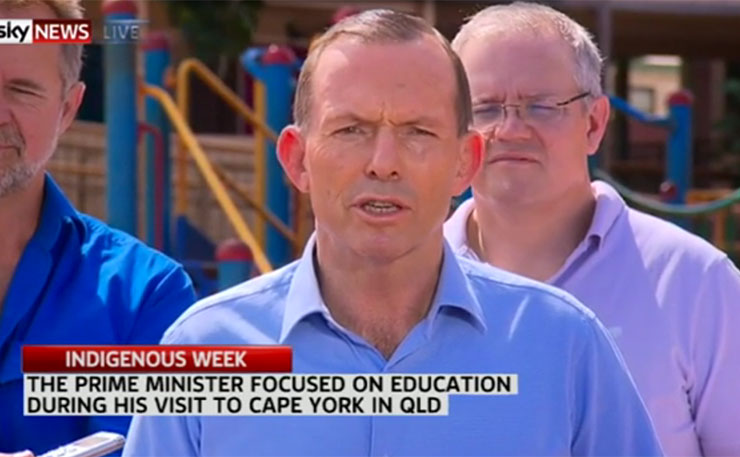
All of them are notable for having failed our people to varying degrees, because 200 years since the invasion of our traditional lands, Aboriginal people are still behind on every social indicator.
We see our children taken away at ever growing rates; the prisons that jail our men, women and children are enjoying exponential growth, in all states at rates higher than black men were jailed under Apartheid South Africa; our cultural heritage has been destroyed in the name of ‘development’.
But in the annals of history, as we look over their political obituaries in Aboriginal affairs, will anyone leave a legacy as damaging, yet as comical, as Tony Abbott?
You be the judge.
A ‘new paternalism’ and blackfellas stop ‘grieving’, shoot camels instead
As Health Minister in the Howard government, Tony Abbott gave a taste of what life for blackfellas might be like under an Abbott administration.
First of all, he oversaw annual shortfalls of up to half a billion dollars in Aboriginal health funding while Health Minister, at a time when the Howard government was delivering record surpluses.
In 2006, he advocated for a ‘new paternalism’ to replace ‘self-determination’, claiming that white guilt and the idealisation of life before invasion was now the biggest obstacle to progress, in an age when everything about the Howard government screamed paternalism.
In that same year, he told Aboriginal people that they should ‘grieve less’ and spend more time ‘shooting camels’ as a means to employment in areas where there are very few jobs, courtesy of almost zero government investment.
“There seems to be an ordinate amount of time taken up with funerals and ceremonies. If you’re going to develop a work culture, you can’t have a three-month ceremonial season (each year) and you can’t take six weeks off because your cousin has died,” he said.
Oh, and in 2006, he was also part of the Howard government which used the sexual abuse of children in Aboriginal communities to launch the greatest human rights abuse in Aboriginal affairs in decades (the NT intervention) as an election ploy.
That intervention lead to a more than quadrupling in self-harm and suicide rates, and a severe feeling of disempowerment over prescribed communities.
If I need to know anything, I’ll talk to Mundine and Pearson
Whenever a mainstream media outlet claims that Abbott is passionate about Aboriginal affairs, that it is close to his heart –consider this.
When Tony Abbott was the shadow minister for Indigenous affairs, with his new boss Malcolm Turnbull as Opposition leader, he infamously quipped that he would ‘like to be closer to the action’ – ie. not in the Aboriginal affairs portfolio. In Canberra, that job was dubbed the ‘toilet cleaner on the titanic’ (by a Labor member, admittedly).
While shadow Indigenous affairs minister, he also told an elected Aboriginal councillor at the NSW Aboriginal Land Council, that if he needed to know anything about Aboriginal affairs, all he had to do was pick up a phone to Warren Mundine or Noel Pearson – two unelected ‘leaders’.
A week-long photo opportunity – Eddie Mabo ‘gave it a go’
Before taking office, Tony Abbott promised to spend the first parliamentary week of the year working in an Indigenous community. He made the commitment at the annual Garma festival.
That promise was quickly abandoned, with his office saying his comments were misinterpreted. Instead, he would still be spending at least one week each year at a black community. And that community was Yirrkala, in north east Arnhem Land. Abbott didn’t stay there the whole week though, instead abandoning the community early to announce he would be sending military personnel to Iraq to join the fight against ISIS.
Only a month ago, he embarked on his second taxpayer-funded jaunt to a remote Indigenous region – the picturesque Torres Strait and Northern Peninsula Area. Abbott visited the grave of Eddie Mabo, despite being part of the Howard government that tried to pass a ‘10 point plan’ to dismantle Native Title in 1998.
While there, he congratulated Mabo for ‘having a go’ and also congratulated the white justice system for “being able to accommodate Eddie Mabo and the other plaintiffs’ cry for justice”. When Mabo was handed down, of course, Abbott was vigorously opposed.
He also visited the thriving Bamaga School, which hosts his ‘remote school attendance officers’, and unwittingly praised an Indigenous education technique while refusing to fund its expansion under the Indigenous Advancement Strategy.
Abbott told the media that the Bamaga School’s success was the result of Noel Pearson’s Direct Instruction strategy, which is being rolled out in remote schools across the country.
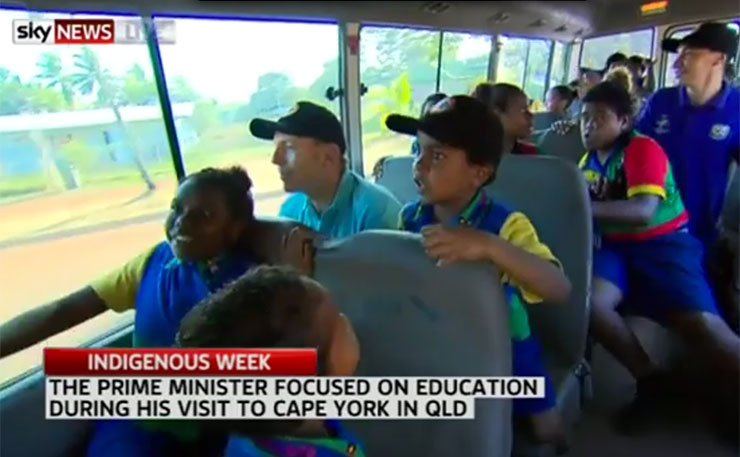
The only problem is, Bamaga School has never had Direct Instruction. They instead have quality teaching staff, and the influence of Dr Chris Sarra’s Stronger Smarter programme, which was knocked back for further funding under the IAS while Pearson’s DI model was expanded.
Slashing the black budget and the chaotic IAS
One of the first announcements in Aboriginal affairs made by Abbott was that he was overseeing a complete shake up of the portfolio – pulling Indigenous affairs into the Department of Prime Minister and Cabinet, and collapsing more than 500 programmes into five broad funding streams that reflect the government’s own priorities – now known as the Indigenous Advancement Strategy.
Oh, and up to half a billion dollars was ripped from the black spending under Abbott’s first budget as PM.
Not only was there less money, but there was also a complicated and confusing process that has been described as traumatic for Aboriginal organisations across the country. It is currently the subject of a Senate inquiry.
Under the IAS, hundreds of community-controlled Aboriginal organisations lost out to big NGOs, and even government departments. Those that were knocked back were given no explanation, while those who were granted funding were left confused over how much, and for how long.
Earlier this month, The Australian’s Amos Aikman reported that “hundreds of millions of dollars in grants listed under the IAS are funding other public agencies, including commonwealth authorities, state and territory departments, local councils and even the ABC”.
“More than half of all grants published in two funding rounds are for amounts of less than $15,000 and for periods of fewer than six months, even though the government has been warned that having many short-term funding agreements can make it difficult for organisations to attract, train and retain Indigenous staff.”
Too close to Twiggy
Jobs are supposedly important for the Abbott government – ‘getting adults into work’ is apparently a priority area.
But the only review into Indigenous employment was conducted by Andrew ‘Twiggy Forrest’ – a mining magnate responsible for causing disastrous divisions amongst the Yindjibarndi mob via his company, Fortescue Metals Group (FMG)’s plans for a billion dollar iron ore mine on their traditional and sacred lands in the Pilbara.
Twiggy’s ‘Creating Parity’ report included recommendations for a ‘Healthy Welfare Card’, which proposes quarantining up to 80 per cent of a person’s welfare payments on ‘necessary’ goods. There is no evidence that income management works, judging from the model rolled out under the NT intervention, and it is a ridiculously expensive policy, costing the Howard then Rudd and Gillard governments hundreds and hundreds of millions of dollars to implement.
Twiggy also recommended strengthening the requirements of the Remote Communities and Jobs Programme (RJCP), which replaced the Aboriginal devised Community Development Employment Projects (CDEP) in remote communities.
Which brings us to… 30 years working for the dole
The RJCP is a policy rolled out by federal Labor, after the Howard government dismantled CDEP in urban, regional and remote areas.
Labor promised to retain CDEP in remote areas, and then completely destroyed it and put in RJCP – a work-for-the-dole programme, which was already awash with controversy.
The $1.5 billion RJCP had been operating in about 60 remote communities since July 2013. Late last year, Indigenous affairs minister Nigel Scullion announced the government’s first response to Andrew Forrest’s Creating Parity report.
Rather than working 16 hours a week for Newstart wages, RJCP participants would instead be required to work 25 hours, five days a week, over 52 weeks in order to receive welfare payments.
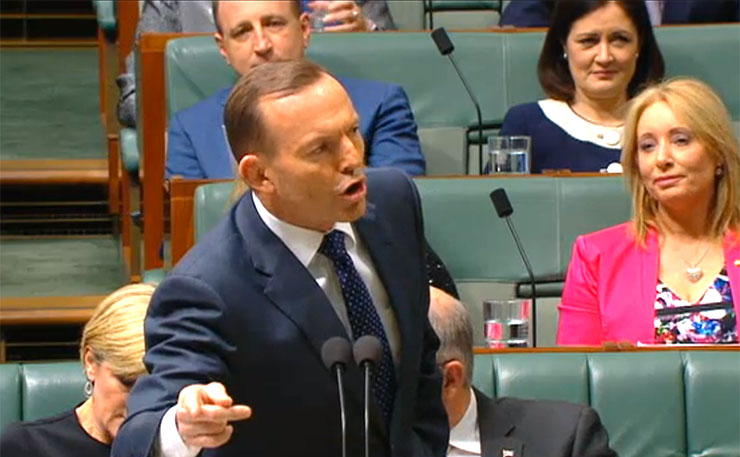
Those in regional areas and cities will only be required to work for 26 hours a week for six months under the Job Active program.
The toughening of RJCP has led to criticism the federal government is condemning Aboriginal workers to the days before equal wages, with remote area participants receiving under award wages of less than $10 an hour.
And in the NT, Aboriginal workers with their income quarantined under the NT intervention, will be working for $5 cash an hour –effectively slave labour. In the absence of jobs in these communities, Indigenous affairs minister Nigel Scullion has already conceded to the Australian newspaper that we could have a situation where Aboriginal workers remain on the programme for the next three decades.
So much for moving people onto jobs?
The RJCP was so controversial that earlier this year, Scullion was forced to rename it – it’s now known as the Community Development Programme (CDP), deceptively similar to CDEP.
Indigenous policy expert Jon Altman condemned it: “(Scullion’s) trying to cash in on the popularity of the old CDEP but at the same time he’s brought in a very draconian remote work-for-the-dole scheme, where you have to work 25 hours a week for the dole.”
‘Nothing but bush’
In November last year, Abbott reiterated the legal fiction of “terra nullius” by claiming Australia was “nothing but bush” before British invasion. He also labelled pre-colonisation civilisation “extraordinarily basic and raw”.
The well-known Anglophile made the comments while hosting a business breakfast for British Prime Minister David Cameron.
“As we look around this glorious city, as we see the extraordinary development, it’s hard to think that back in 1788 it was nothing but bush and that the Marines, and the convicts and the sailors that struggled off those 12 ships just a few hundred yards from where we are… must have thought they’d come almost to the Moon.
“Everything would have been so strange. Everything would have seemed so extraordinarily basic and raw and now a city, which is one of the most spectacular cities on our globe, and in a country which is as free and as fair and as prosperous as any.”
British ‘settlement’ the great defining moment
One man’s ‘settlement’ is another man’s ‘invasion’. Abbott again did his bit for whitewashing history by saying last year “the arrival of the First Fleet was the defining moment in the history of this continent. Let me repeat that, it was the defining moment in the history of this continent. It was the moment this continent became part of the modern world”.
For a Prime Minister for Aboriginal Affairs, Tony Abbott demonstrated a startling ignorance of the true history of this continent – the 60 to 70,000 years Aboriginal nations successfully managed the grand swathes of land.
In fact, Aboriginal people could have been the world’s first farmers. Historian Bill Gammage and Aboriginal author Bruce Pascoe have both written about the complicated and sophisticated system of land management that condemned the notion of blackfellas as ‘hunters and gatherers’ to the realm of myth.
Indeed, Aboriginal people could also have been the world’s first miners, the world’s first astronomers, the world’s first navigators, and many many more. Not that Abbott would ever acknowledge that.
The Prime Minister of ‘Lifestyle Choices’
The nation was shocked when Western Australia’s Barnett government announced plans to close up to 150 remote communities.
The impetus was the Abbott government’s offloading of remote infrastructure and municipal services back to the states. The Barnett government claimed the Commonwealth was putting a gun to its head, and rather than take up the bill and deliver services that are the right of every other Australian, it instead claimed it would simply close down whole communities.
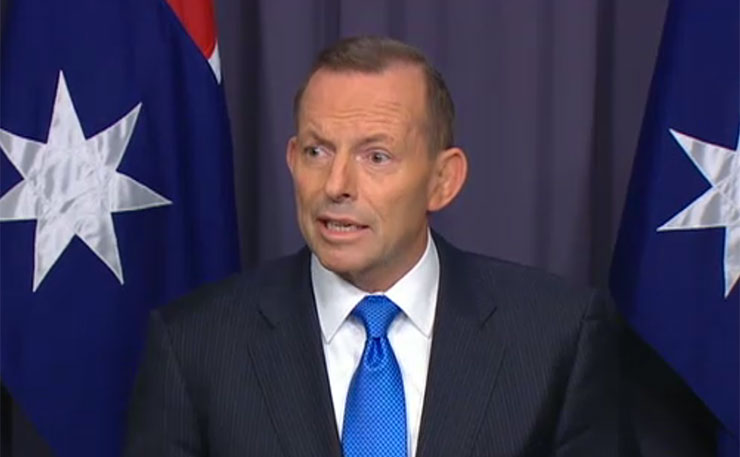
That would force Aboriginal people off their traditional homelands and into more regional and urban centres, putting a strain on those services, and once again condemning blackfellas to the margins of towns.
When asked to comment on Barnett’s plans, Abbott blamed Aboriginal people for their poverty.
“What we can’t do is endlessly subsidise lifestyle choices if those lifestyle choices are not conducive to the kind of full participation in Australian society that everyone should have,” Abbott said.
“If people choose to live miles away from where there’s a school, if people choose not to access the school of the air, if people choose to live where there’s no jobs, obviously it’s very, very difficult to close the gap.”
In Tony Abbott’s world, Aboriginal people “choose” to live in remote Australia and do not have an understanding of the economic realities which they are supposed to abide by and embrace.
Abbott shifted his government’s failures to ‘Close the Gap’ on the shoulders of Aboriginal people, who supposedly are making “choices” that undermine his government’s attempts to help them.
In prioritising economic development over the right of Aboriginal people to culture and ceremony, his rhetoric was not based on history, but rooted firmly in paternalism.
Abbott assumes Aboriginal people have the same choices as non-Indigenous peoples, despite successive governments working to restrict the ability of our people to make choices which may not suit the government’s own agenda.
Rivers of money to the Cape York Welfare Reform Trials
Tony Abbott has been perhaps, Cape York lawyer Noel Pearson’s biggest supporter, although both sides of politics (including the Qld government) have pumped at least $140 million into his expensive Cape York Welfare Reform Trials.
In fact, while in opposition, Abbott spent time in both Coen and Aurukun, volunteering and pronouncing the benefits of the trials.
But the outcomes of the trials have never justified the level of expenditure.
A recent report compiled by Jesuit Social Services Australia and Catholic Social Services Australia charted the most disadvantaged communities in the country.
In Queensland, the most disadvantaged was Aurukun – which has hosted the welfare trials for the past seven years – and has been the community that has soaked up the most funding from the trials.
Aurukun has deteriorated significantly over those seven years. It also mentions Doomadgee, which is also a part of the trials.
“Two locations (Aurukun and Doomadgee) have experienced increased disadvantage between 2007 and 2014,” the report says.
“Aurukun’s deterioration is evident in a range of indicators, including: Criminal convictions (ranked 11th in 2007 and 1st in 2014); young adults not engaged in work or study (ranked 107th in 2007 and 5th in 2014) and unemployment (ranked 262nd in 2007 and 10th in 2014).”
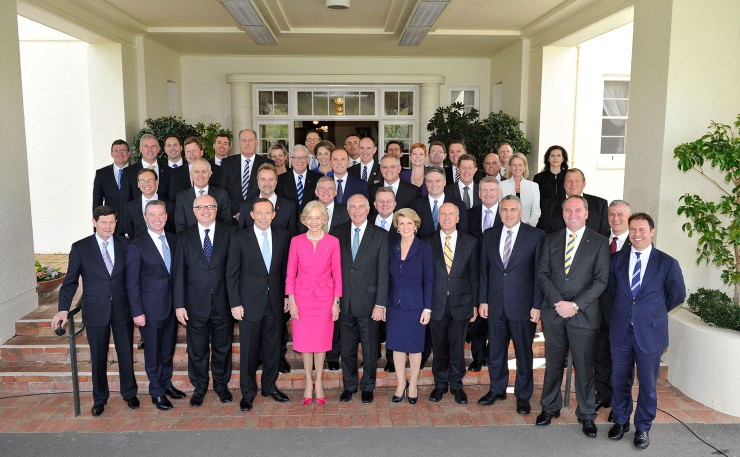
When it comes to education, Aurukun still is ranked low in the state. For Year 3 numeracy, it was ranked 18th, for Year 9 numeracy, it was even lower at 9th.
For young adults not engaged, the report ranked it among the top five most disadvantaged in the country.
It’s not exactly the education revolution you would expect from a trial worth millions of dollars.
The farce of constitutional reform
In December 2014, Tony Abbott promised to ‘sweat blood’ on a referendum to recognise Aboriginal people in the constitution. It was another broken promise.
There is already a great deal of cynicism across Aboriginal Australia about whether constitutional reform is the right way forward, or simply a distraction, a ‘smoke and mirrors’ game designed to deflect away from true aspirations of treaty and sovereignty.
There is no talk of a referendum, and no talk of a model. Abbott has danced around any suggestion of concrete reform to the constitution, like removing the race power, driving perception that it will be nothing other than a ‘fluffy’ preamble that will do nothing.
A couple of months ago Tony Abbott hosted a meeting of 40 hand-picked Aboriginal and Torres Strait Islander ‘leaders’, a few of which were simply plucked from Recognise’s own office. Even Abbott’s mate Pearson criticised the meeting, saying it was “quite astounding” and the outcome “pre-determined”.
Abbott later wrote to Pearson and Patrick Dodson, along with a number of other ‘leaders’, knocking back the prospect of Indigenous-only conferences to nut out the details of a model, saying he was concerned it would lead to a “log of claims”.
If Aboriginal people don’t have ownership over the constitutional reform debate, then what, exactly, is the point?
The Indigenous Advisory Council
In the absence of any true representative model for blackfellas, Tony Abbott appointed his other Aboriginal mate – Warren Mundine – to the role of chief Aboriginal affairs advisor, placing him at the head of his hand-picked Indigenous Advisory Council.
It came as he refused to re-fund the only thing close to a national elected Indigenous body – the National Congress of Australia’s First Peoples.
The IAC revived memories of the Howard government’s farcical National Indigenous Council, which, among other things, recommended amending the NT Aboriginal Land Rights Act to allow for compulsory acquisition of land if Traditional Owners refused a 99-year lease from any applicant, white or black.
Not exactly a great record for our mob.
But Abbott was even worse when dealing with the IAC, because he even refused to listen to them. Mundine held no political sway, instead the reigns remained firmly in the hands of Indigenous affairs minister Nigel Scullion.
Vale Tony Abbott
In all, Abbott’s reign as the Prime Minister for Indigenous Affairs was as uninspiring as it was unsuccessful.
Our people remain mired in poverty, but with even less hope for a future, and greater confusion about how they might secure one.
Like WorkChoices, Tony Abbott’s reign over Indigenous aspirations is dead and buried. He will not be missed.
Donate To New Matilda
New Matilda is a small, independent media outlet. We survive through reader contributions, and never losing a lawsuit. If you got something from this article, giving something back helps us to continue speaking truth to power. Every little bit counts.

